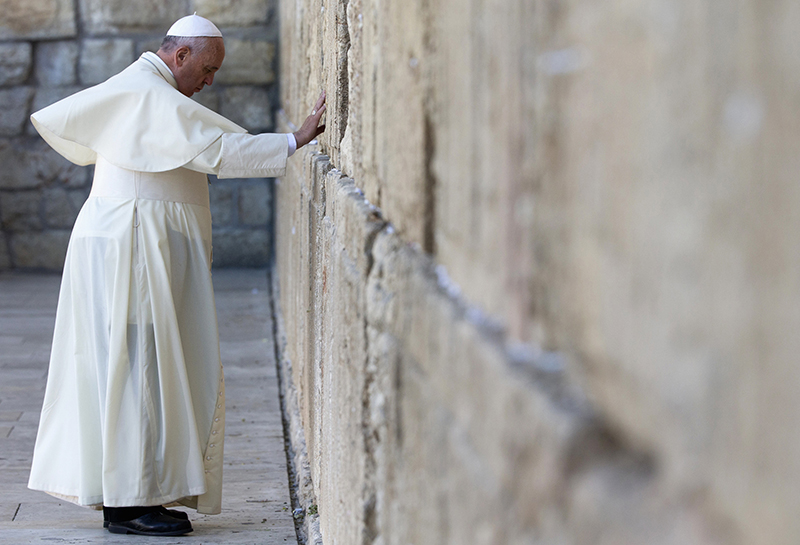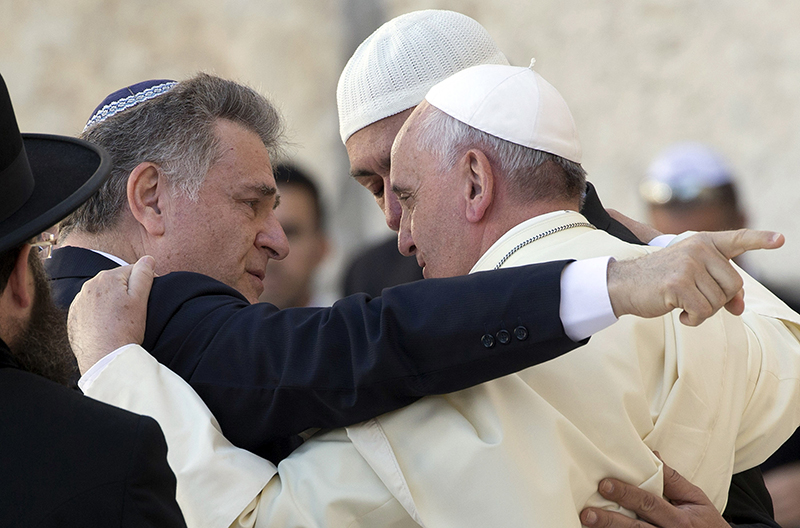
(RNS) — Some of Pope Francis’ recent statements on Israel have been a source of pain for Jewish communities and leaders. However, they reside within a wider context of deep friendship.
Whatever recent feelings of hurt Jewish leaders might have, we should focus on the late pope’s broader work to fight antisemitism as we reflect upon his legacy.
Francis began his dialogue with Jewish leaders decades before he was elected to the papacy. In Argentina, where he served as a priest, bishop, archbishop and cardinal, he became a dear friend of the Chief Rabbi Abraham Skorka. They maintained each other’s confidences on life and leadership, and co-authored a pathbreaking book, “On Heaven and Earth,” about the nature of their beliefs and practices. They modeled how Jewish-Catholic friendship can both be of personal significance and transformational to our respective approaches to God, community and practice.
When he was elected pope in 2013, Francis immediately reiterated the close relationship between Judaism and Catholicism. During his visit to Israel in 2014, he not only prayed at the Western Wall in Jerusalem and grieved the victims of the Holocaust at Yad Vashem, but laid a wreath at the grave of Theodor Herzl, the founder of modern Zionism. In doing so, Francis showed he, too, believed in the need for the Jewish people to have a state of their own, and that their lack of belief in Jesus did not consign them to exile in diaspora.

Pope Francis meets concentration camp survivors in the former Nazi German concentration and extermination camp Auschwitz-Birkenau in Oswiecim, Poland, July 29, 2016. (Photo by David W. Cerny/Reuters)
When Francis visited Auschwitz in 2016, he showed the depth of his empathy for Jewish loss and awareness of the Holocaust’s horrors. He prayed for “forgiveness for so much cruelty” carried out against Jews and other groups at this site of mass murder. He also acknowledged through his symbolic example the importance of remembering the Holocaust and condemning antisemitism as a virulent form of hate.
We can understand Francis as advancing the vision of “Nostra Aetate,” which 60 years ago transformed Catholic-Jewish relations. He saw that the Catholic Church could become — and must become — a protector of the Jewish people, doctrinally opposed to antisemitism and supportive of its life and vitality. It could do so, not only in fighting antisemitism, but also in building deep, enduring friendships with Jewish communities and leaders. While he did so in ways that sometimes felt imperfect, Francis always led with love and sincerity in his efforts.
In Jewish tradition, we commemorate loved ones through prayer, charity and righteous deeds. Through our traditional paths, Jewish communities can help carry forward Francis’ legacy in humble yet meaningful ways. We can comfort our bereaved Catholic friends and neighbors and share of our own sense of loss. We can reach out to Catholic leaders and attend public commemorations. We can pray. We can donate to charities that support Catholic-Jewish collaboration.

Pope Francis embraces two good friends of his traveling with him, Argentine Rabbi Abraham Skorka, left, and Omar Abboud, leader of Argentina’s Muslim community, partially seen behind the pope, as he visits the Western Wall in Jerusalem’s Old City, May 26, 2014. Both friends joined the pontiff’s official delegation for the trip in a sign of interfaith friendship. (AP Photo/Andrew Medichini, Pool)
Yet, we can do the most through our deeds.
In this time of remembrance for Francis, we are called to reach out and build enduring bridges of dialogue and collaboration with Catholic leaders. As we read in the “Nostra Aetate” declaration, which he held dear, “Since the spiritual patrimony common to Christians and Jews is thus so great, this sacred synod wants to foster and recommend that mutual understanding and respect which is the fruit, above all, of biblical and theological studies as well as of fraternal dialogues.”
Francis’ memory can be an enduring blessing to Catholics and Jews alike if we use it to redouble friendship between our communities.
(Rabbi Joshua Stanton is associate vice president for interfaith and intergroup initiatives at the Jewish Federations of North America. The views expressed in this commentary do not necessarily reflect those of RNS.)
